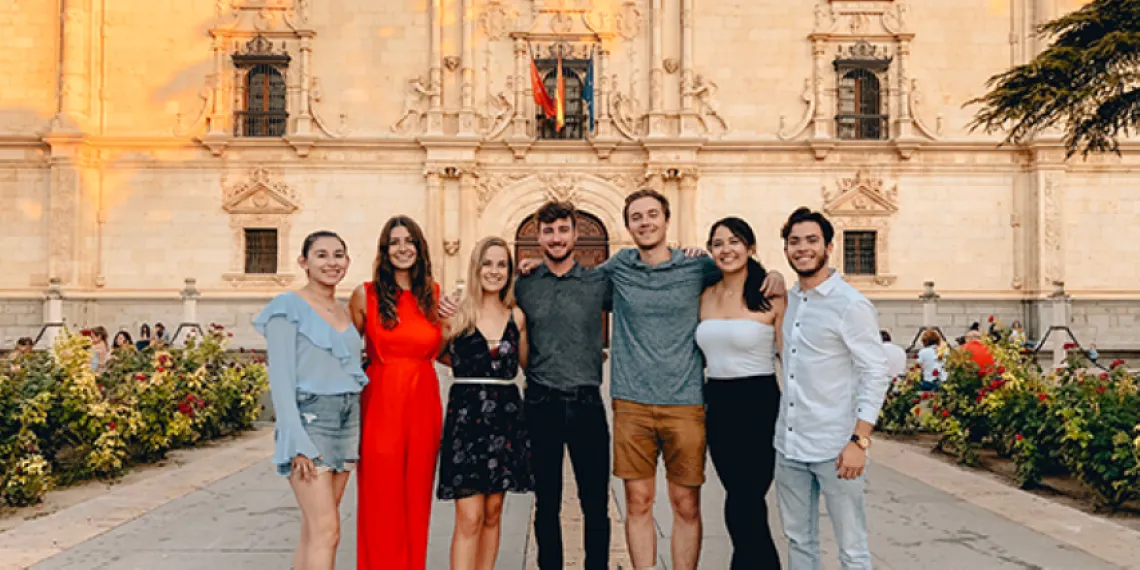What is Study Abroad?

Many students voice an interest in studying abroad during their time at college, but you may find yourself wondering: what exactly does it mean to study abroad?
What is Study Abroad?
Studying abroad means earning credits toward a University of Arizona degree while in another country. Students can go abroad for a semester, summer, full academic year, or during the university’s winter and spring breaks. Depending on your student’s program, they may be traveling with professors from the University of Arizona or they may be taking classes at an approved partner university. The University of Arizona offers over 80 programs for students to choose from around the world, all carrying the approval of academic advisors and study abroad coordinators here at the University of Arizona. Students can weigh their academic, professional, and personal goals—such as learning a language, completing an internship, developing a greater appreciation for other cultures, studying their major in a city on the cutting edge of the topic, traveling to a specific region, or any other aspirations they may have—to decide which program is the right fit for them.
Why Study Abroad?
As the world becomes increasingly interconnected, employers want to hire individuals who can adapt and thrive in a variety of contexts. Students who develop cultural competencies and can apply their knowledge and skills in a global context are the world’s future leaders. UArizona Study Abroad programs are intentionally structured to provide enriching experiences that develop these skills.
Studies show that studying abroad improves students' experience in college and bolsters their career prospects and that students who study abroad are more likely to graduate and earn better grades. Additionally, students who study abroad report increased confidence, independence, adaptability, and intercultural competence—all qualities that employers look for in new college graduates.
How Can my Student Learn More about Studying Abroad?
As a starting point, students can meet with Peer Advisors, who are students who have recently returned from studying abroad, to get their perspective on program options and general advice. Once students have narrowed down their program options, they should meet with a Study Abroad Coordinator, who will help them:
- Set goals for their experience.
- Evaluate how studying abroad will keep them on track for graduation.
- Find budgeting resources.
- Understand health and safety protocols.
- Stay involved when they return.
How Can Families Get Involved?
- Explore the Resources for Families page.
- Watch a previous Family Information Session or attend one listed on our calendar.
- Encourage your student to fully complete their pre-departure steps, attend all mandatory meetings, and check in regularly with their Academic Advisor and Study Abroad Coordinator.
- Make copies of essential documents your student is taking abroad, such as passports, credit/debit cards, and health insurance.
- Talk with your student about what to do when specific challenges arise.
Diana & Brandon Frees, parents of a UArizona Study Abroad alum, share:
“Studying abroad is a very structured process and can be easily managed. Our student had access to the study abroad team for questions we had regarding academics, financials, and housing. Our primary tip is to listen without immediately saying no. It will be nerve-wracking to send your child thousands of miles away, but we believe that the experience is worth it. Discuss every detail, big to small, with your student, an advisor, or member of the study abroad team. Knowing the details will help you support them and will ease your nerves as a parent.”
Maria Esther & Luis Verduzco, parents of a UArizona Study Abroad alum, share:
“I think we felt the natural fears of parents, but we knew the university offered great programs, and we knew how valuable it would be for her personal growth to live in and experience a new culture. Our tip to parents is to be available for advice, support, and checking on their safety, but allow some independence, let them to be the final decision makers. Ensure that they have a reliable means of communication and a reliable living situation. This is key to your student’s experience and your comfort level. The personal growth we saw when our daughter returned was mind-blowing. She grew in confidence, independence, and maturity, became very strong in French, and gained life lessons that she could not have learned in a classroom.”

